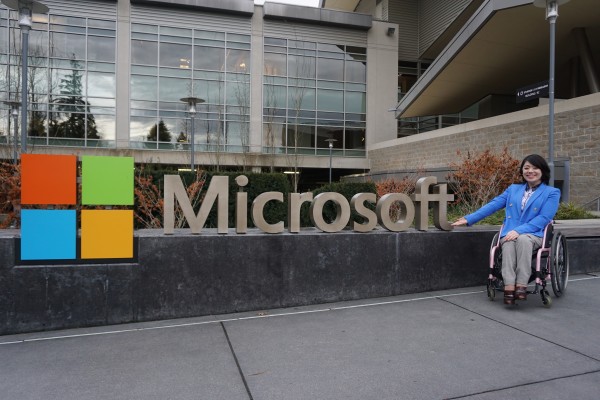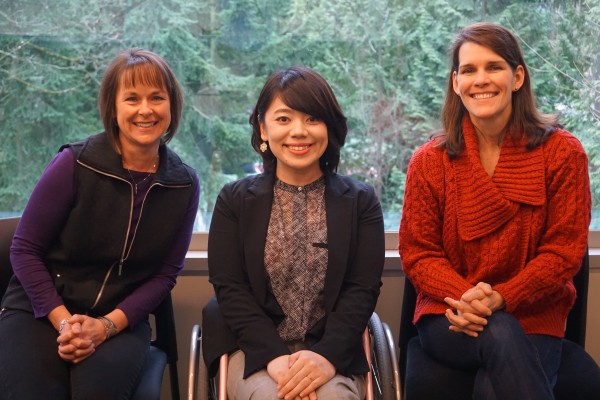この記事は次の言語でも読めます:日本語

In Seattle, I have visited one of the global companies in high-tech industry, Microsoft.
From my experiences of interviewing high-tech companies in Silicon Valley, I found that the industry has been leading accessibility for product and service, and utilizing assets of employees with disabilities to strengthen the business.
Therefore, at Microsoft, I was very excited to find the opportunity to talk with Nicole Kelley, a strategy director of Global Diversity & Inclusion and Teresa McDade, a director of Work & Life Benefits.

Unlike Japanese employment system, US companies do not have required quota system(*) for hiring people with disabilities.
US companies simply view and evaluate abilities and experiences of candidates including people with disabilities. So does Microsoft.
From the beginning of the interview, Nicole clearly mentioned that
“People with disabilities are potential employees.
We look at them as being the same as others in terms of potential candidates for our open roles.”
What made me surprised is Microsoft has implemented different ways of hiring process for people with disabilities.
One of them is a pilot program to hire people with autism.
Last Spring, Mary Ellen Smith, an executive sponsor of Cross Disability Employee Resource Group, announced this new program targeted at people with autism on April 1, 2015 at United Nations (U.N.) Headquarters in New York City.
Microsoft found that there are a lot of barriers in general interview process for people with autism.
To overcome the challenge, they started an alternate screening to find applicants with appropriate technical skills and evaluate the candidates through four weeks of a hiring academy – a combination workshop and interview to help put job candidates at ease (and therefore let them more fully demonstrate their skills).
By giving the applicants realistic tasks in real working environment, Microsoft can recognize that the inhering strength of autism brain’s intense focus and intense attention to details.
Eleven people have graduated from the pilot program and they are secured into Microsoft at roles.
With successful result of the first pilot program, the company is readying to expand and improve the program into the second iteration. More information on this effort can be found here.
The more interesting part is that the program has an intensive manager training component as well.
On the Microsoft business side, the program identifies managers who are opening and willing to be educated around how to work better with a person with autism as well as how to leverage the strengths of each individual.
Nicole said
“To the great benefits (to Microsoft), we found that they just became better inclusive managers.
We think about that as fundamental to many other trainings that we offer across the board.
If you become a more inclusive leader, you simply become a better leader and able to fully leverage the breadth of diversity on your team – whether it is people with autism, female employee, generation employee, etc.”
In Japan, employment for people with disabilities has a different start line and is separated from people without disabilities in many cases.
When you go to a company website and click “Employment Information” or “Career” page, you will easily find an employment page like this:

Personally I had considered this system not fair for a long time, because there are candidates with disabilities have enough skills and experience that they can compete within candidates without disabilities and do great work.
On the other hand, it is also true that some candidates with disabilities may not have adequate skill to compete in general interview process, which process itself can designate to evaluate the performance of people without disability(*1).
For those applicants with disabilities, this separation system can work better. After learning about “Hiring Academy” at Microsoft, I have found that the separated hiring process is not necessary always a negative thing.
The issue in the Japanese hiring system is that companies consider “all” kinds of people with disabilities as one group and separated all of them from general employment system.
People with disabilities are very diverse.
Depending on the type of disability and its level, people with disabilities can do various things in different fields and various degrees.
Companies in Japan should learn more about the specialties of each disability and differences in individuals.
Some of the specialties can work really well for different roles and make truly valuable impacts nobody else can — just like Microsoft has found ways to uncover true values of individuals including people with autism.
For more information about inclusive hiring for disabilities at Microsoft, please access from here.
